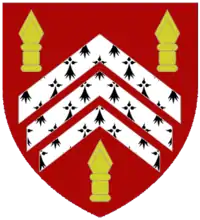John Llewellin, 1st Baron Llewellin
John Jestyn Llewellin, 1st Baron Llewellin GBE MC TD PC (6 February 1893 – 24 January 1957) was a British army officer, Conservative Party politician and minister in Winston Churchill's war government.
The Lord Llewellin | |
|---|---|
 | |
| Governor-General of the Federation of Rhodesia and Nyasaland | |
| In office 4 September 1953 – 24 January 1957 | |
| Monarch | Elizabeth II |
| Preceded by | Office established |
| Succeeded by | Sir Robert Clarkson Tredgold |
| Minister of Aircraft Production | |
| In office 22 February 1942 – 22 November 1942 | |
| Prime Minister | Winston Churchill |
| Preceded by | The 1st Baron Brabazon of Tara |
| Succeeded by | Sir Stafford Cripps |
| President of the Board of Trade | |
| In office 4 – 22 February 1942 | |
| Prime Minister | Winston Churchill |
| Preceded by | Sir Andrew Duncan |
| Succeeded by | Hugh Dalton |
| Member of Parliament for Uxbridge | |
| In office 30 May 1929 – 5 July 1945 | |
| Preceded by | Sir Dennistoun Burney, Bt |
| Succeeded by | Frank Beswick |
| Personal details | |
| Born | 6 February 1893 |
| Died | 24 January 1957 (aged 63) |
| Political party | Conservative |
Background
Llewellin was the son of William Llewellin, of Upton House, Dorset, and Frances Mary, daughter of L. D. Wigan. He was educated at Eton.[1]
Military career
Llewellin was commissioned into the Royal Garrison Artillery in 1914 and reached the rank of Major during the First World War, winning the Military Cross in 1917.[2] He remained in the Territorial Army after the war and was promoted to Lieutenant-Colonel commanding the Dorset Heavy Brigade in 1932. He was promoted Colonel in 1936 and retired in 1938. He was appointed an Officer of the Order of the British Empire (OBE) in 1926,[3] promoted to a Commander (CBE) in 1939,[4] and then was made a Knight Grand Cross (GBE) in 1953.[5]
Political career
Llewellin was elected Member of Parliament (MP) for Uxbridge in Middlesex in 1929. He held a number of ministerial posts in the Coalition government, eventually serving as President of the Board of Trade for two weeks in 1942. He subsequently became Minister of Aircraft Production until replaced by Sir Stafford Cripps in November 1942.[6] Later, Llewellin served on the Combined Policy Committee set up by the British and United States governments under the Quebec Agreement of 1943 to oversee the construction of the atomic bomb.
In December 1943 Llewellin's seat on the committee was assumed by Sir Ronald Campbell and Llewellin became Minister of Food, the position he held until the Churchill government fell to the Labour Party of Clement Attlee in July 1945. Llewellin lost his seat in the election and was raised to the peerage as Baron Llewellin, of Upton in the County of Dorset.[7] After the war he served as Governor General of the Federation of Rhodesia and Nyasaland between 1953 and his death in January 1957.
Personal life
Lord Lewellin died in January 1957, aged 63. The barony became extinct with his death.
Arms
  |
|
References
- thepeerage.com John Jestyn Llewellin, 1st and last Baron Llewellin
- "No. 30450". The London Gazette (Supplement). 1 January 1918. p. 40.
- "No. 33179". The London Gazette (Supplement). 3 July 1926. p. 4408.
- "No. 34633". The London Gazette (Supplement). 8 June 1939. p. 3858.
- "No. 39933". The London Gazette. 7 August 1953. p. 4303.
- Butler & Butler 1994, pp. 17–20.
- "No. 37287". The London Gazette. 28 September 1945. p. 4814.
- Burke's Peerage. 1856.
Bibliography
- Butler, David; Butler, Gareth (1994). British Political Facts 1900–1994 (7 ed.). Basingstoke and London: The Macmillan Press.
External links
| Wikimedia Commons has media related to John Jestyn Llewellin, 1st Baron Llewellin. |
- Hansard 1803–2005: contributions in Parliament by John Jestyn Llewellin
| Parliament of the United Kingdom | ||
|---|---|---|
| Preceded by Sir Dennistoun Burney, Bt |
Member of Parliament for Uxbridge 1929–1945 |
Succeeded by Frank Beswick |
| Political offices | ||
| Preceded by Sir Andrew Duncan |
President of the Board of Trade 1942 |
Succeeded by Hugh Dalton |
| Preceded by John Moore-Brabazon |
Minister of Aircraft Production 1942 |
Succeeded by Sir Stafford Cripps |
| Preceded by The Lord Woolton |
Minister of Food 1943–1945 |
Succeeded by Sir Ben Smith |
| Government offices | ||
| New title | Governor-General of the Federation of Rhodesia and Nyasaland 1953–1957 |
Succeeded by Robert Clarkson Tredgold |
| Peerage of the United Kingdom | ||
| New creation | Baron Llewellin 1945–1957 |
Extinct |
.svg.png.webp)